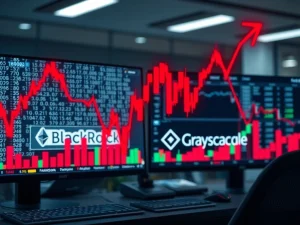Shocking Market Crash: Bitcoin and Stocks Tumble on ‘Fake News’ as BTC Whales Accelerate Accumulation

Hold onto your hats, crypto enthusiasts! The global markets just experienced a rollercoaster, leaving both Bitcoin and traditional stocks reeling. What triggered this dramatic downturn? A whisper of a ’90-day tariff pause’ that turned out to be nothing more than ‘fake news’. While panic selling gripped many, a fascinating trend emerged: Bitcoin whales are leveraging this market crash to aggressively accumulate more BTC. Let’s dive into the details of this volatile day and what it means for the future of Bitcoin.
Market Crash Contagion: How Fake News Triggered a Global Sell-Off
April 7th will be remembered as a day of significant market turmoil. Global financial markets witnessed a sharp downturn, with US equities leading the plunge. The S&P 500, a key indicator of US stock market performance, dropped by a staggering 2.79%, officially entering bear market territory after falling 20% from its recent peak. This sell-off erased over $2 trillion in value in a single day!
Interestingly, a brief ray of hope emerged when a rumor circulated on social media platform X (formerly Twitter) suggesting that former US President Donald Trump was considering a 90-day tariff pause. This sparked a momentary 6% rally in the S&P 500 and even pushed Bitcoin price above $80,000. However, this optimism was short-lived.
Just 30 minutes after the rally began, the White House swiftly debunked the rumor, confirming it as ‘fake news’. This confirmation extinguished the fleeting market optimism, sending both stocks and Bitcoin back into a downward spiral.
The impact wasn’t limited to the US. Asian markets, heavily reliant on global trade, were hit even harder. Hong Kong’s equity index suffered a catastrophic 13% drop – its worst performance since the Asian financial crisis! Major indexes in Shanghai, Taipei, and Tokyo also experienced severe declines, ranging from 7% to 10%. The Nikkei 225 futures even had to suspend trading after hitting circuit breakers, highlighting the severity of the panic.
Adding fuel to the fire, tensions between the US and China escalated further. President Trump reiterated his threat to impose an additional 50% tariff on Chinese exports if China didn’t retract its initial 34% tariffs on US goods by April 8th. This looming trade war scenario further exacerbated the negative market sentiment.
BTC Whales Ignore the Panic: Why Are They Accumulating During the Downturn?
While the broader market panicked, Bitcoin initially showed signs of decoupling from US stock indexes in the preceding days. However, the ‘fake news’ driven market crash proved too strong to resist. Bitcoin price dipped 6.5% over the weekend, hitting new yearly lows of $74,457 on April 7th – the lowest point since November 7th.
Despite the bearish price action and predictions of further drawdowns, data reveals a compelling counter-narrative: BTC whales are doubling down. CryptoQuant’s head of research, Julio Moreno, cautioned against ‘catching the falling knife,’ indicating that overall market conditions haven’t yet improved for Bitcoin. However, Glassnode data paints a different picture regarding whale behavior.
Accumulation Trend: Decoding Whale Buying Spree
According to Glassnode, Bitcoin whales, defined as entities holding over 10,000 BTC, are significantly increasing their accumulation. Conversely, smaller holders, possessing less than 1 BTC to 100 BTC, are continuing to distribute or sell their holdings.
The Accumulation Trend Score for whales briefly reached a perfect 1.0 around April 1st, signifying a 15-day buying spree – the most substantial since late August 2024. Since March 11th, whales have added a massive 129,000 BTC to their holdings, maintaining a strong accumulation trend score of 0.65.
This divergence in behavior between whales and smaller holders is striking. While smaller investors may be reacting to fear and market volatility by selling, whales appear to view the market crash as a prime buying opportunity. This could indicate strong long-term conviction in Bitcoin‘s potential among the largest holders.
Key Takeaways on Whale Accumulation:
- Aggressive Buying: BTC whales are on a significant buying spree, accumulating large quantities of Bitcoin.
- Contrarian Strategy: They are buying during a market downturn when many others are selling.
- Long-Term Bullishness: This accumulation suggests strong long-term confidence in Bitcoin’s future value.
Is This Tariff Pause Fiasco a Buying Signal for Bitcoin?
The ‘fake news’ driven market crash served as a stark reminder of the fragility of market sentiment and the interconnectedness of global economies. While the tariff pause rumor proved false, the underlying tensions and economic uncertainties remain.
For Bitcoin, this event highlights its potential as a safe-haven asset, at least in the eyes of whales. Despite the price dip, the significant accumulation by large holders suggests that they see value in Bitcoin even amidst market turmoil.
Furthermore, data from Axel Adler Jr., a Bitcoin researcher, indicates a potentially positive supply dynamic. His metric, tracking Bitcoin yearly supply change and new coins, shows a positive uptick, suggesting growing demand or accumulation outpacing new supply. Historically, such increases have coincided with Bitcoin price recoveries.
Final Thoughts: Riding the Volatility Wave
The recent market crash, triggered by misinformation and fueled by global economic anxieties, has created a volatile environment for both traditional stocks and cryptocurrencies. However, within this chaos, a powerful signal emerges from BTC whales: they are not panicking; they are accumulating. This suggests a strong underlying belief in Bitcoin‘s long-term value, even when faced with short-term market turbulence. Whether this whale accumulation will indeed lead to a price recovery remains to be seen, but it’s a crucial factor to watch as the market navigates these uncertain times.
Disclaimer: This article is for informational purposes only and should not be considered financial advice. Cryptocurrency investments are highly risky, and you could lose money. Always conduct thorough research and consult with a financial advisor before making any investment decisions.










